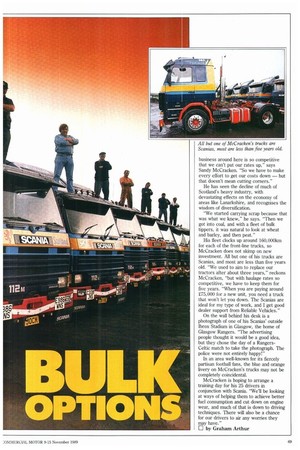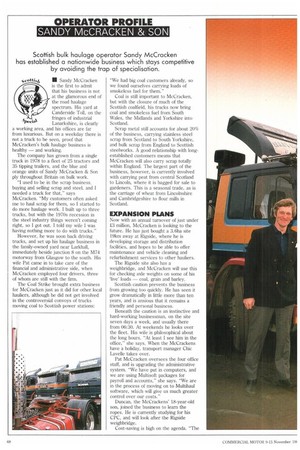1111111.11(
Page 71

Page 70

If you've noticed an error in this article please click here to report it so we can fix it.
OPTIONS
Scottish bulk haulage operator Sandy McCracken has established a nationwide business which stays competitive by avoiding the trap of specialisation.
• Sandy McCracken is the first to admit that his business is not at the glamorous end of the road haulage spectrum. His yard at Canderside Toll, on the fringes of industrial Lanarkshire, is clearly
a working area, and his offices are far from luxurious. But on a weekday there is not a truck to be seen, proof that McCracken's bulk haulage business is healthy — and working.
The company has grown from a single truck in 1978 to a fleet of 25 tractors and 35 tipping trailers, and the blue and orange units of Sandy McCracken & Son ply throughout Britain on bulk work.
"I used to be in the scrap business, buying and selling scrap and steel, and I needed a truck for that," says McCracken. "My customers often asked me to haul scrap for them, so I started to do more haulage work. I built up to three trucks, but with the 1970s recession in the steel industry things weren't coming right, so I got out. I told my wife I was having nothing more to do with trucks."
However, he was soon back driving trucks, and set up his haulage business in the family-owned yard near Larkhall, immediately beside junction 8 on the M74 motorway from Glasgow to the south. His wife Pat came in to take care of the financial and administrative side, when McCracken employed four drivers, three of whom are still with the firm.
The Coal Strike brought extra business for McCracken just as it did for other local hauliers, although he did not get involved in the controversial convoys of trucks moving coal to Scottish power stations: "We had big coal customers already, so we found ourselves carrying loads of smokeless fuel for them."
Coal is still important to McCracken, but with the closure of much of the Scottish coalfield, his trucks now bring coal and smokeless fuel from South Wales, the Midlands and Yorkshire into Scotland.
Scrap metal still accounts for about 20% of the business, carrying stainless steel scrap from Scotland to South Yorkshire, and bulk scrap from England to Scottish steelworks. A good relationship with longestablished customers means that McCracken will also carry scrap totally within England. The largest part of the business, however, is currently involved with carrying peat from central Scotland to Lincoln, where it is bagged for sale to gardeners. This is a seasonal trade, as is the carriage of wheat from Lincolnshire and Cambridgeshire to flour mills in Scotland.
EXPANSION PLANS
Now with an annual turnover of just under £3 million, McCracken is looking to the future. He has just bought a 3.6ha site 19km away at Rigside, where he is developing storage and distribution facilities, and hopes to be able to offer maintenance and vehicle cleaning and refurbishment services to other hauliers.
The Rigside site also has a weighbridge, and McCracken will use this for checking axle weights on some of his 'live' loads — coal, grain and barley.
Scottish caution prevents the business from growing too quickly. He has seen it grow dramatically in little more than ten years, and is anxious that it remains a friendly and personal business.
Beneath the caution is an instinctive and hard-working businessman, on the site seven days a week, and usually there from 06:30. At weekends he looks over the fleet. His wife is philosophical about the long hours. "At least I see him in the office," she says. When the McCrackens have a holiday, transport manager Chic Lavelle takes over.
Pat McCracken oversees the four office staff, and is upgrading the administrative system. "We have put in computers, and we are using Multisoft packages for payroll and accounts," she says. "We are in the process of moving on to Multihaul software, which will give us much greater control over our costs."
Duncan, the McCrackens' 18-year-old son, joined the business to learn the ropes. He is currently studying for his CPC, and will look after the Rigside weighbridge.
Cost-saving is high on the agenda. "The business around here is so competitive that we can't put our rates up," says Sandy McCracken. "So we have to make every effort to get our costs down — but that doesn't mean cutting corners."
He has seen the decline of much of Scotland's heavy industry, with devastating effects on the economy of areas like Lanarkshire, and recognises the wisdom of diversification.
"We started carrying scrap because that was what we knew," he says. "Then we got into coal, and with a fleet of bulk tippers, it was natural to look at wheat and barley, and then peat."
His fleet clocks up around 160,000km for each of the front-line trucks, so McCracken does not skimp on new investment. All but one of his trucks are Scanias, and most are less than five years old. "We used to aim to replace our tractors after about three years," reckons McCracken, "but with haulage rates so competitive, we have to keep them for five years. When you are paying around £75,000 for a new unit, you need a truck that won't let you down. The Scanias are ideal for my type of work, and I get good dealer support from Reliable Vehicles."
On the wall behind his desk is a photograph of one of his Scanias' outside Ibrox Stadium in Glasgow, the home of Glasgow Rangers. "The advertising people thought it would be a good idea. but they chose the day of a RangersCeltic match to take the photograph. The police were not entirely happy!"
In an area well-known for its fiercely partisan football fans, the blue and orange livery on McCracken's trucks may not be completely coincidental.
McCracken is hoping to arrange a training day for his 25 drivers in conjunction with Scania. "We'll be looking at ways of helping them to achieve better fuel consumption and cut down on engine wear, and much of that is down to driving techniques. There will also be a chance for our drivers to air any worries they may have."
0 by Graham Arthur




























































































































